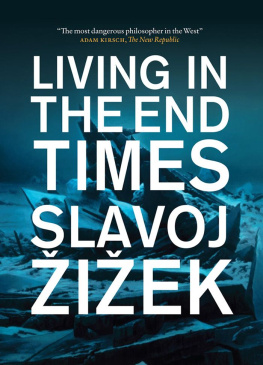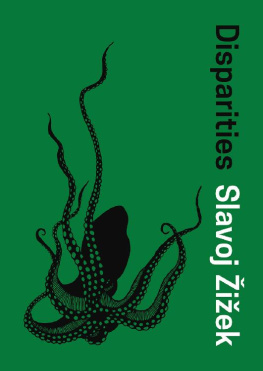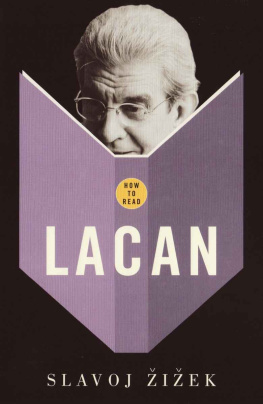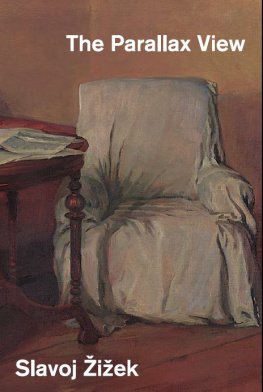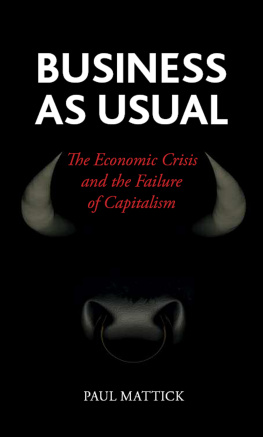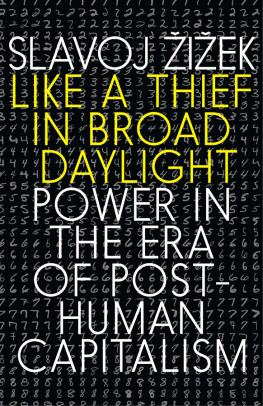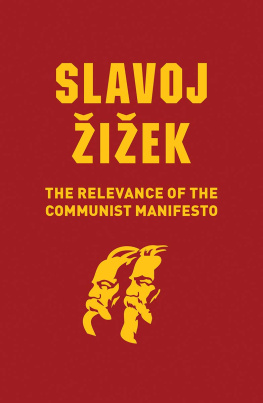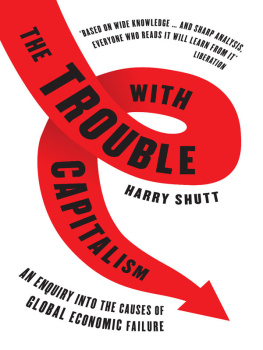LIVING IN THE END TIMES
Slavoj iek is a Slovenian philosopher and cultural critic. He is a professor at the European Graduate School, International Director of the Birkbeck Institute for the Humanities, Birkbeck College, University of London, and a senior researcher at the Institute of Sociology, University of Ljubljana, Slovenia. His books include First as Tragedy, Then as Farce, In Defense of Lost Causes, four volumes of the Essential iek, and many, many more titles.
LIVING IN THE END TIMES

SLAVOJ IEK

This revised, updated paperback edition published by Verso 2011
First published by Verso 2010
Slavoj iek 2011
All rights reserved
The moral rights of the author have been asserted
1 3 5 7 9 10 8 6 4 2
Verso
UK: 6 Meard Street, London W1F 0EG
US: 20 Jay Street, Suite 1010, Brooklyn, NY 11201
www.versobooks.com
Verso is the imprint of New Left Books
ISBN-13: 978-1-84467-702-3
British Library Cataloguing in Publication Data
A catalogue record for this book is available from the British Library
Library of Congress Cataloging-in-Publication Data
A catalog record for this book is available from the Library of Congress
Typeset in Cochin by Hewer Text UK Ltd, Edinburgh
Printed in the US by Bell & Bain
Contents
Introduction: The Spiritual Wickedness in the Heavens
The twentieth anniversary of the fall of the Berlin Wall should have been a time for reflection. It has become a clich to emphasize the miraculous nature of the fall of the Wall: it was like a dream come true. With the disintegration of the Communist regimes, which collapsed like a house of cards, something unimaginable happened, something one would not have considered possible even a couple of months earlier. Who in Poland could have imagined the arrival of free elections, or Lech Wasa as president? We should, however, note that an even greater miracle was to occur only a few years later: namely, the return of the ex-Communists to power through free democratic elections, and the total marginalization of Wasa who had become even more unpopular than the man who, a decade and a half earlier, had attempted to crush Solidarno in a military coupGeneral Wojciech Jaruzelski.
The standard explanation for this later reversal evokes the immature utopian expectations of the majority, whose desire was deemed contradictory, or, rather, inconsistent. The people wanted to have their cake and eat it: they wanted capitalist-democratic freedom and material abundance but without paying the full price of life in a risk society; that is, without losing the security and stability once (more or less) guaranteed by the Communist regimes. As sarcastic Western commentators duly noted, the noble struggle for freedom and justice turned out to be little more than a craving for bananas and pornography.
When the unavoidable sense of disappointment set in, it gave rise to three (sometimes opposed, sometimes overlapping) reactions: (1) nostalgia for the good old Communist era;populism; (3) a renewed and belated anti-Communist paranoia. The first two reactions are easy enough to comprehend. Communist nostalgia in particular should not be taken too seriously: far from expressing a genuine wish to return to the grey reality of the pre-existing regime, it was closer to a form of mourning, a process of gently relinquishing the past. The rise of rightist populism, for its part, is not an Eastern European specialty, but a feature common to all countries caught up in the vortex of globalization. More interesting then is the third reaction, the weird resurrection of anti-Communist paranoia two decades on. To the question If capitalism is really so much better than socialism, why are our lives still miserable? it provides a simple answer: it is because we are not yet really in capitalism, for the Communists are still ruling, only now wearing the masks of new owners and managers...
It is an obvious fact that, among the people protesting against the Communist regimes in Eastern Europe, a large majority of them were not demanding a capitalist society. They wanted social security, solidarity, some kind of justice; they wanted the freedom to live their own lives outside the purview of state control, to come together and talk as they please; they wanted a life liberated from primitive ideological indoctrination and the prevailing cynical hypocrisy. As many perspicuous analysts have observed, the ideals that inspired the protesters were to a large extent taken from the ruling socialist ideology itselfthey aspired to what can most appropriately be designated Socialism with a human face.
The crucial question is how we are to read the collapse of these hopes. The standard answer, as we have seen, appeals to capitalist realism, or the lack of it: the people simply did not possess a realistic image of capitalism; they were full of immature utopian expectations. The morning after the enthusiasm of the drunken days of victory, the people had to sober up and face the painful process of learning the rules of the new reality, coming to terms with the price one has to pay for political and economic freedom. It is, in effect, as if the European Left had to die twice: first as the totalitarian Communist Left, then as the moderate democratic Left which, over recent years, has been gradually losing ground in Italy, in France, in Germany. Up to a point, this process can be accounted for by the fact (Freud wrote about Unbehagen in der Kultur, the discontent/unease in culture; today, twenty years after the fall of the Berlin Wall, we experience a kind of Unbehagen in liberal capitalism. The key question now is: who will articulate this discontent? Will it be left to nationalist populists to exploit? Therein resides the big task for the Left.)
Should we, then, dismiss the utopian impulse which motivated the anti-Communist protests as a sign of immaturity, or should we remain faithful to it? At this point, it is well worth noting that the resistance to Communism in Eastern Europe in fact took three successive forms: (1) the revisionist Marxist critique of really-existing Socialisms (this is not true Socialism, we want a return to the authentic vision of Socialism as a free society)here one might slyly remark that the same process went on in the early modern period in Europe, where secular opposition to the hegemonic role of religion first had to express itself in the guise of religious heresy; (2) the demand for an autonomous space of civil society freed from the constraints of Party-State control (this was the official position of Solidarity during the first years of its existenceits message to the Communist Party was: we do not want power, we just want a free space outside your control where we can engage in critical reflection on what goes on in society); (3) finally, the open struggle for power: we do want full democratically legitimized power; which means its time for you to go. Are the first two forms really just illusions (or rather, strategic compromises), and therefore to be discarded?
The underlying premise of the present book is a simple one: the global capitalist system is approaching an apocalyptic zero-point. Its four riders of the apocalypse are comprised by the ecological crisis, the consequences of the biogenetic revolution, imbalances within the system itself (problems with intellectual property; forthcoming struggles over raw materials, food and water), and the explosive growth of social divisions and exclusions.
Next page
